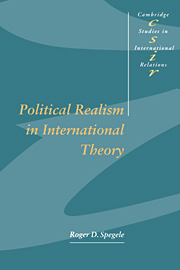Book contents
- Frontmatter
- Contents
- Preface
- Acknowledgements
- Part 1
- Part 2
- 4 Evaluative political realism: a beginning
- 5 State and state-systems in evaluative political realism
- 6 Evaluative political realism and human nature
- 7 Evaluative political realism and historical realism
- 8 Evaluative political realism as moral realism
- 9 Conclusion
- Notes
- Bibliography
- Index
- CAMBRIDGE STUDIES IN INTERNATIONAL RELATIONS
7 - Evaluative political realism and historical realism
from Part 2
Published online by Cambridge University Press: 30 October 2009
- Frontmatter
- Contents
- Preface
- Acknowledgements
- Part 1
- Part 2
- 4 Evaluative political realism: a beginning
- 5 State and state-systems in evaluative political realism
- 6 Evaluative political realism and human nature
- 7 Evaluative political realism and historical realism
- 8 Evaluative political realism as moral realism
- 9 Conclusion
- Notes
- Bibliography
- Index
- CAMBRIDGE STUDIES IN INTERNATIONAL RELATIONS
Summary
Faithfulness to the truth of history involves far more than research, however patient and scrupulous, into special facts … The narrator must seek to imbue himself with the life and spirit of the time … He must himself be, as it were, a sharer or spectator of the action he describes.
Francis ParkmanIntroduction
It is a remarkable, though often unnoticed, fact that such realist thinkers as E.H. Carr, Sir Herbert Butterfield, Martin Wight, Hans J. Morgenthau, Friedrich Meinecke, George Kennan, Kenneth Thompson, Raymond Aron (among others), despite a variety of other differences, shared a deep sense of the many ways in which international politics is bound up with historical concepts, categories and methods. As one self-identified ‘older’ realist has put it: ‘No school of thought or “theory” concerned with international relations is closer to history … than is political realism.’ Continued insistence on the intimate connection between history and political realism is both necessary and desirable; nonetheless, for the ‘newer’, more self-conscious political realist we have been calling evaluative political realist this kind of declaration effectively ignores a central yet obvious question: which conception of history? There are different understandings of history and since they have conflicting implications, it is incumbent on the evaluative political realist to identify the main features of her conception of history. So the leading question here is this: is there a conception of history which captures the realist's point of view in international relations and which, as it turns out, may be regarded as superior to rival conceptions of history? Evaluative political realism affirms that there is and that it is best identified, though with some trepidation, as historical realism.
- Type
- Chapter
- Information
- Political Realism in International Theory , pp. 162 - 190Publisher: Cambridge University PressPrint publication year: 1996

